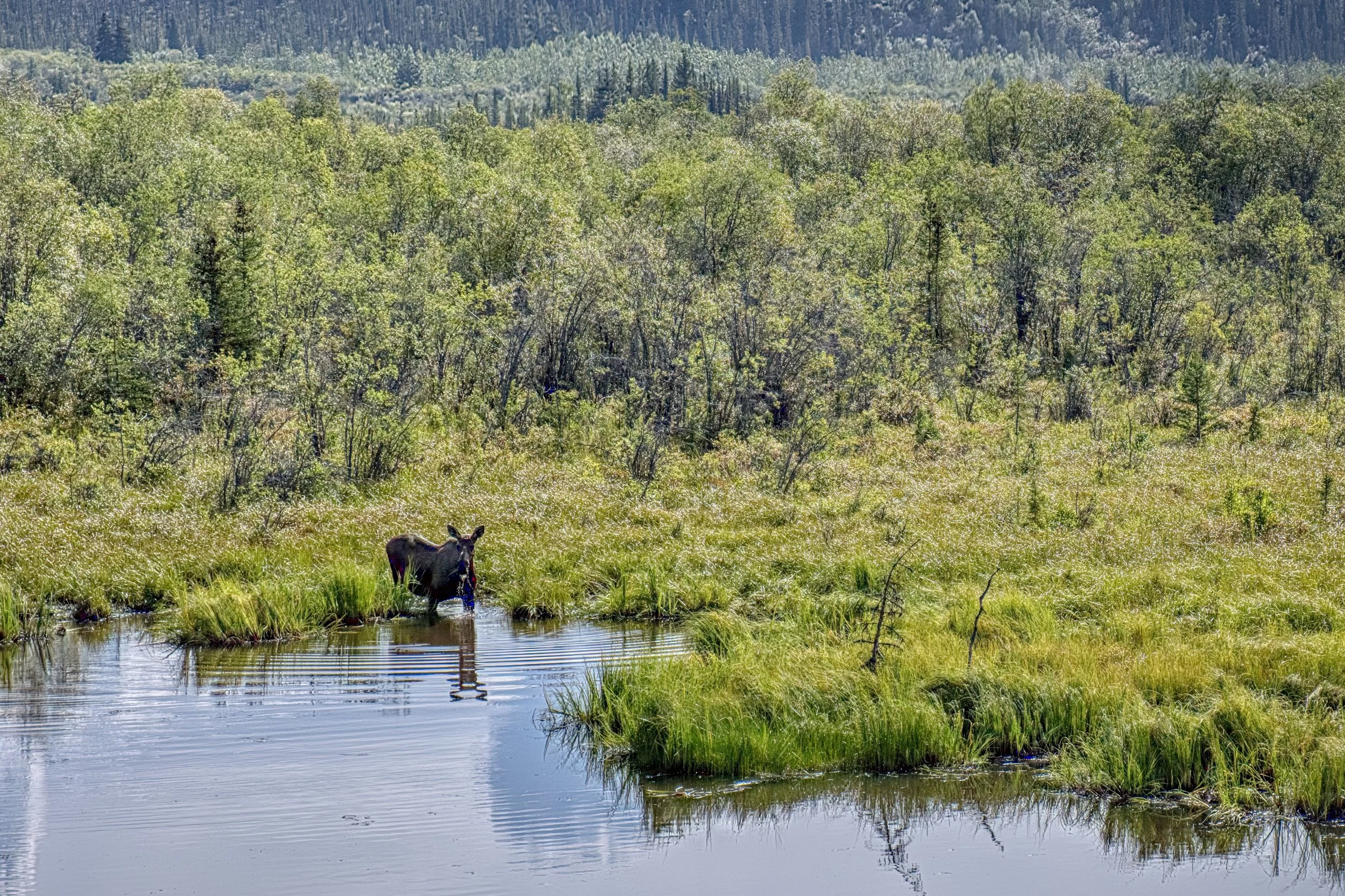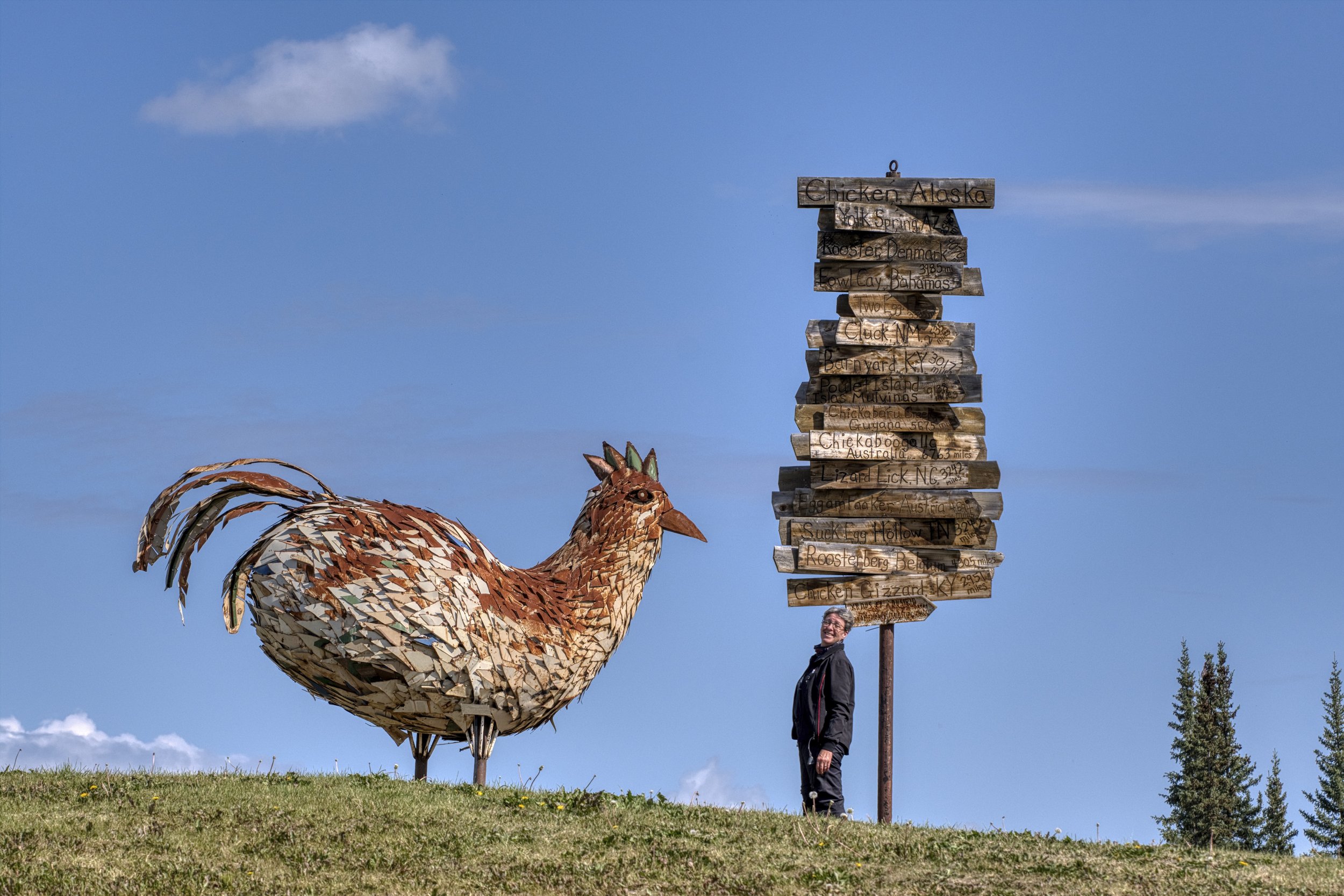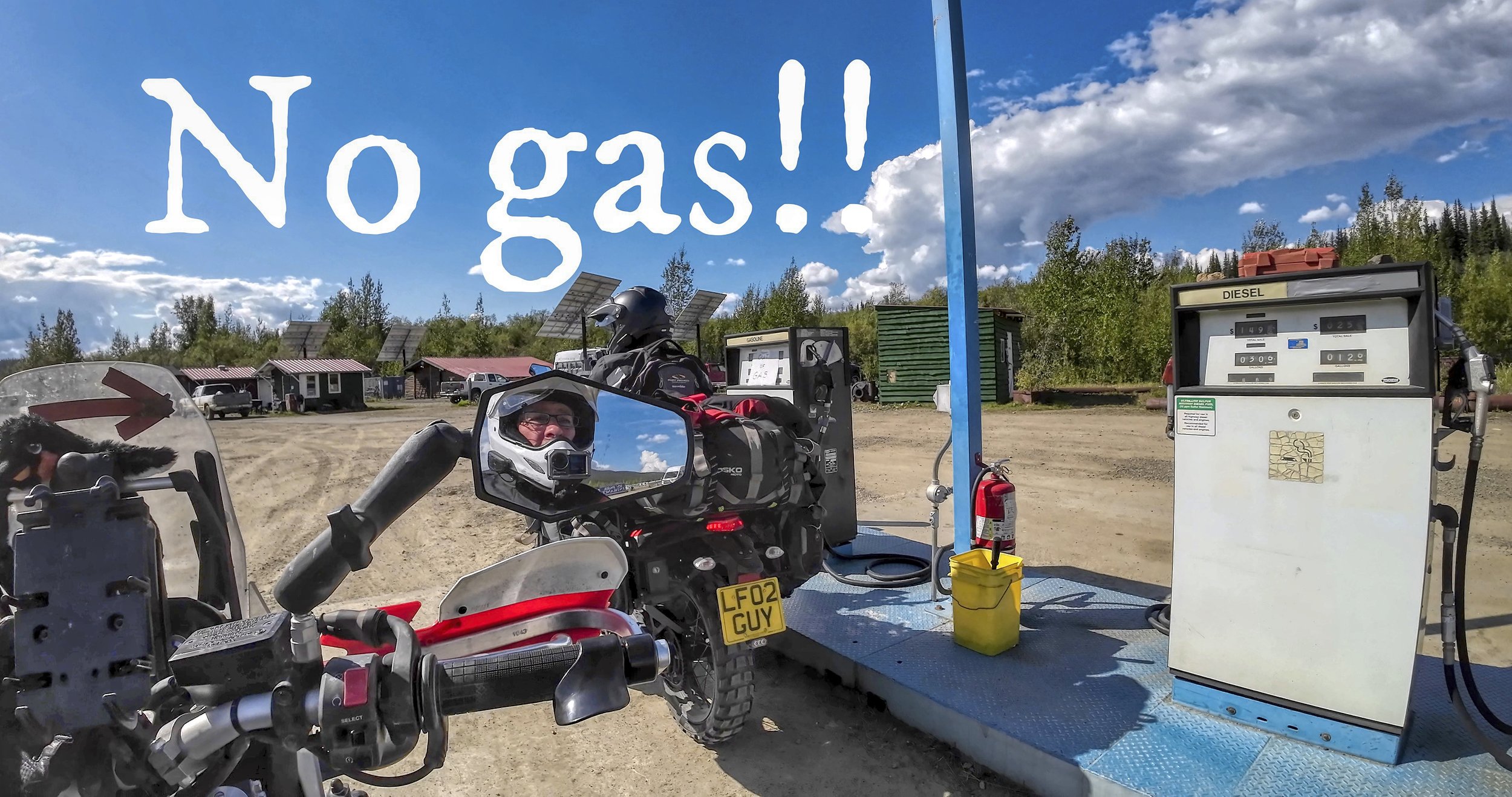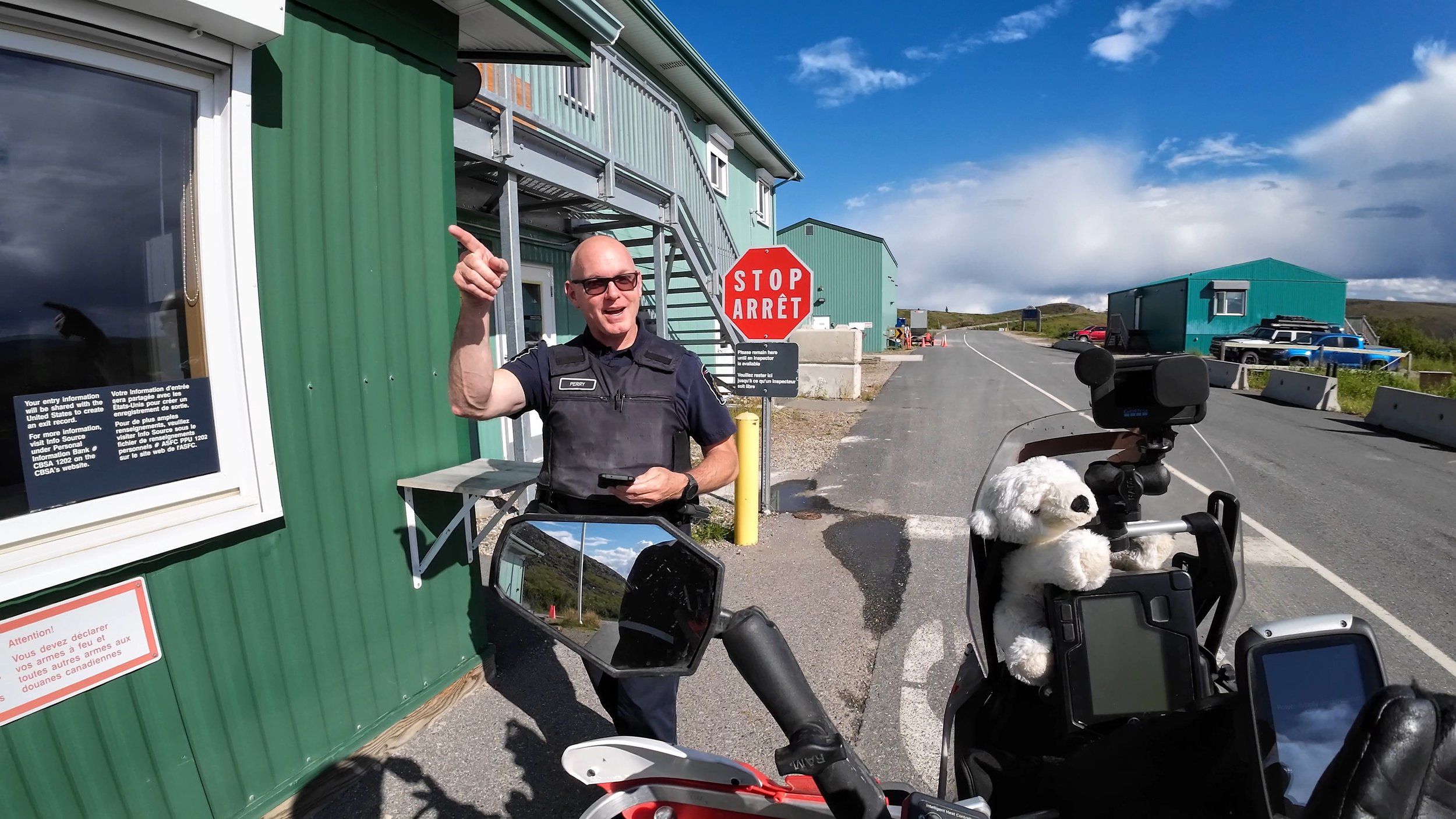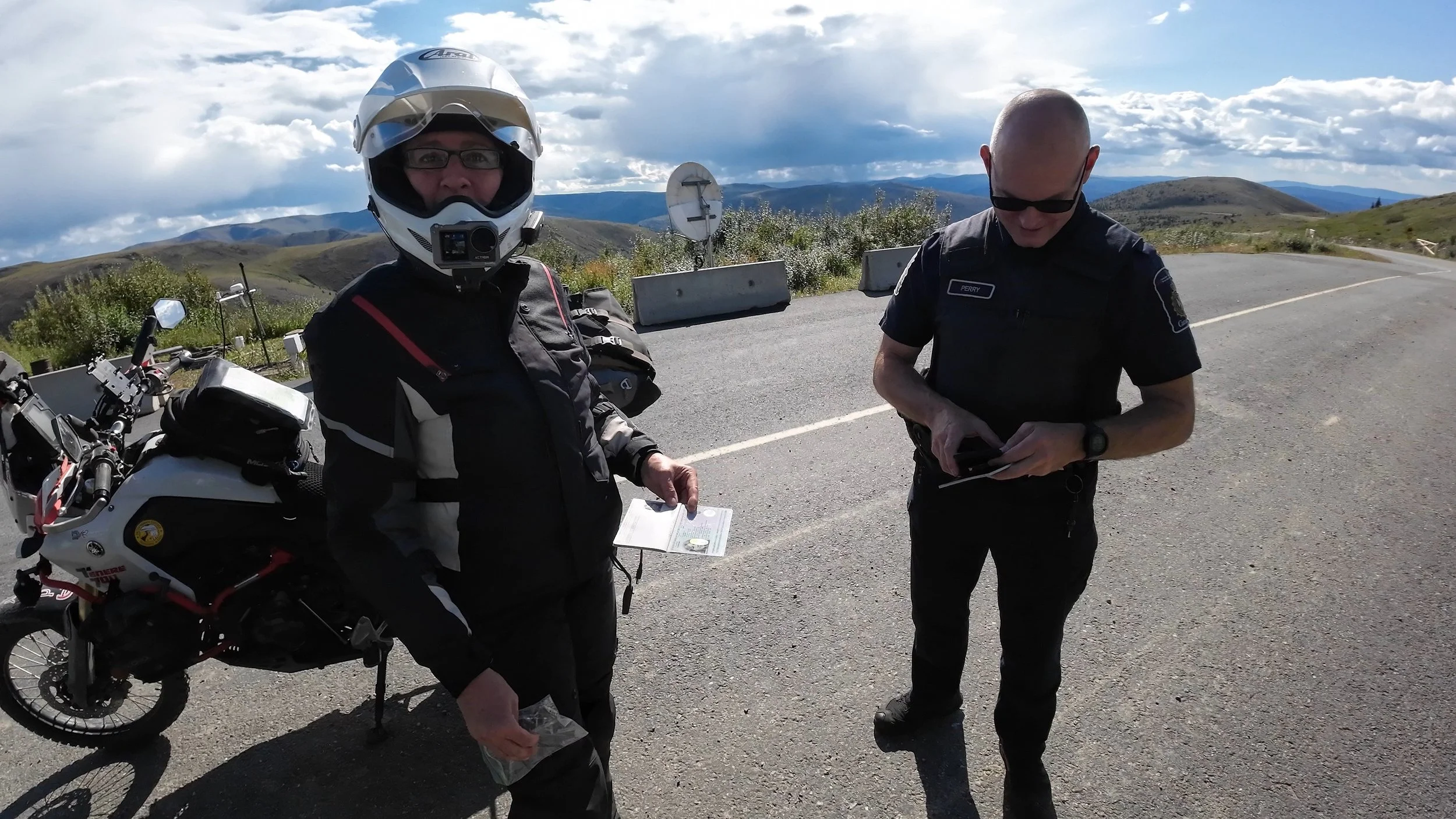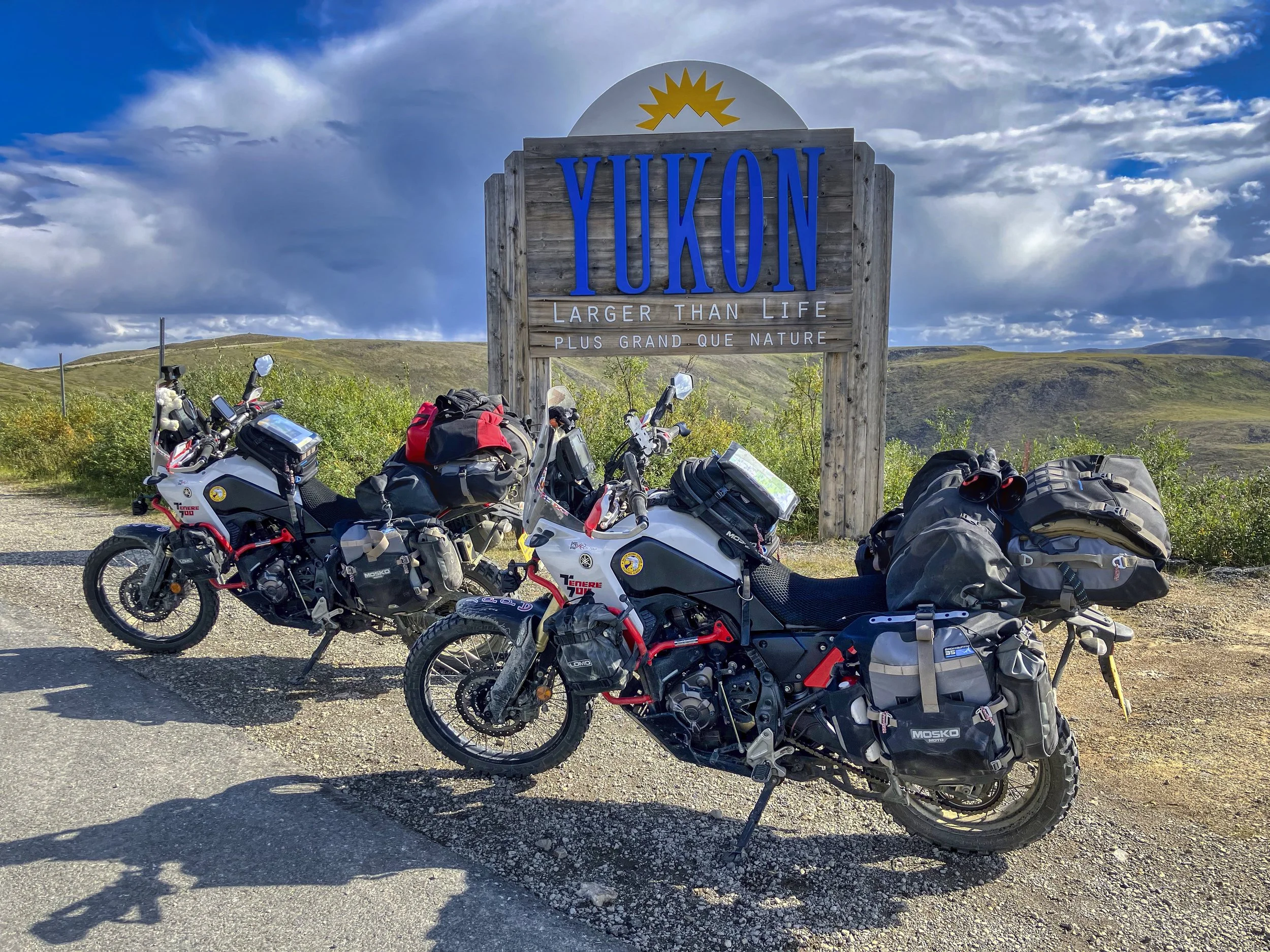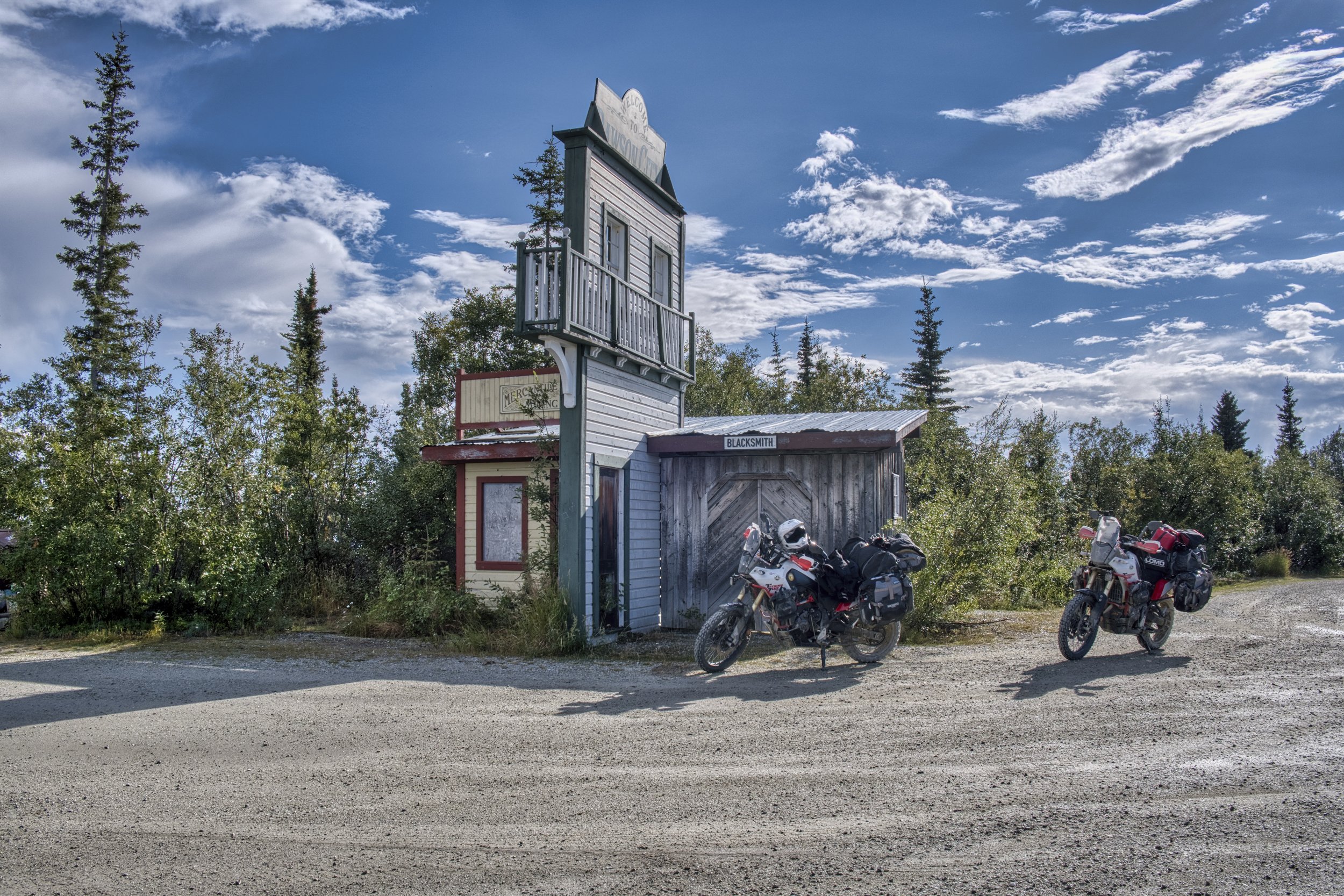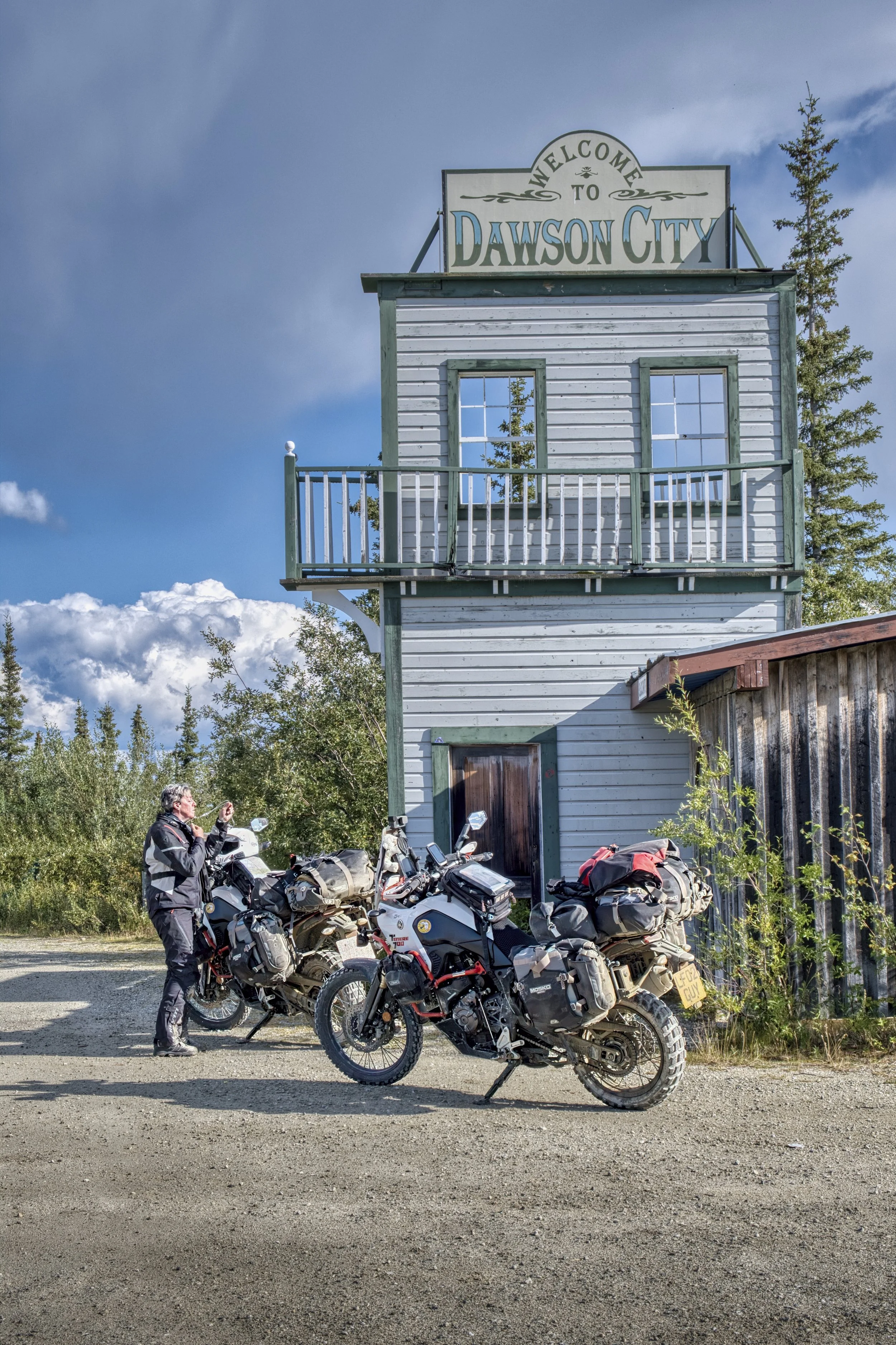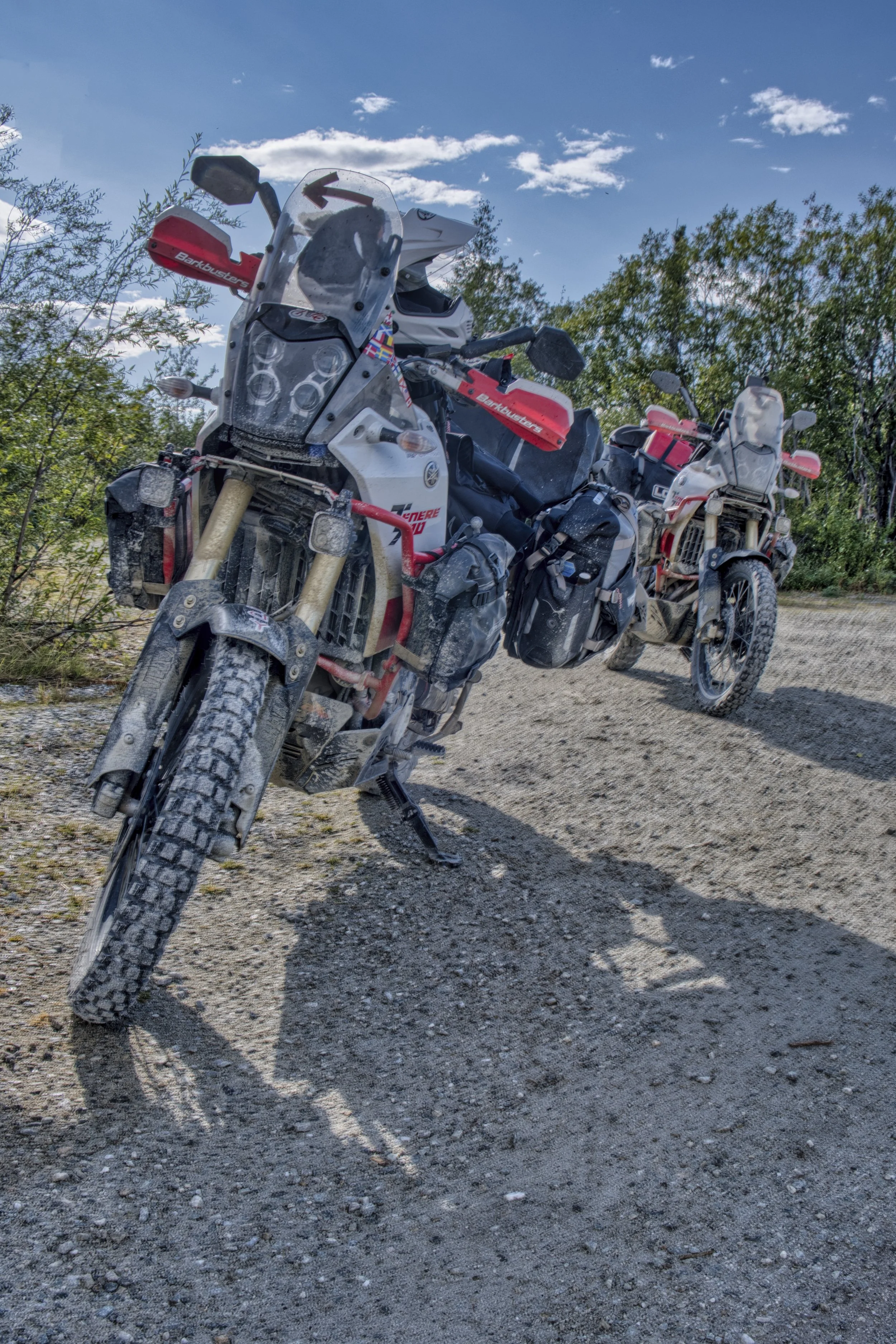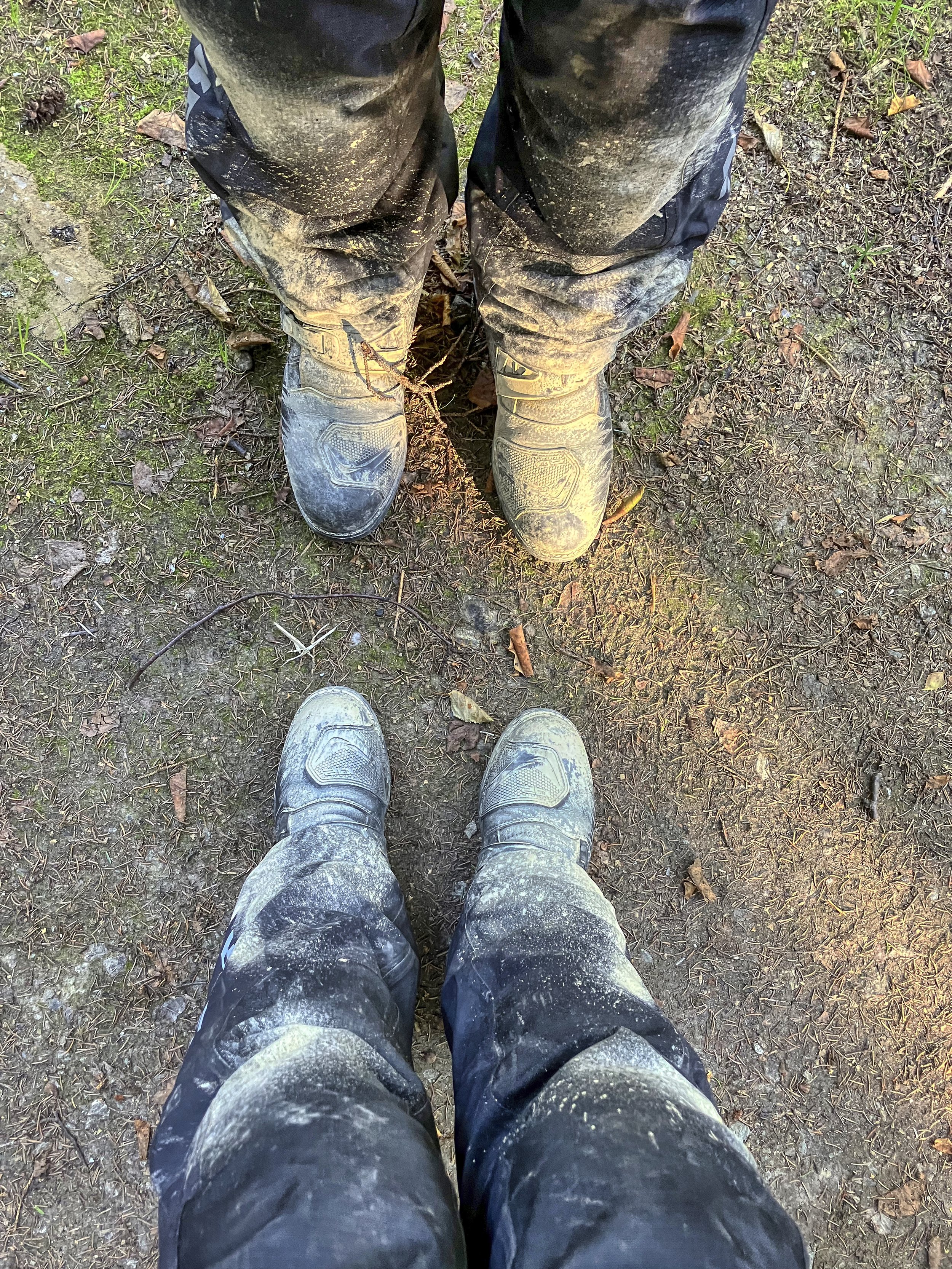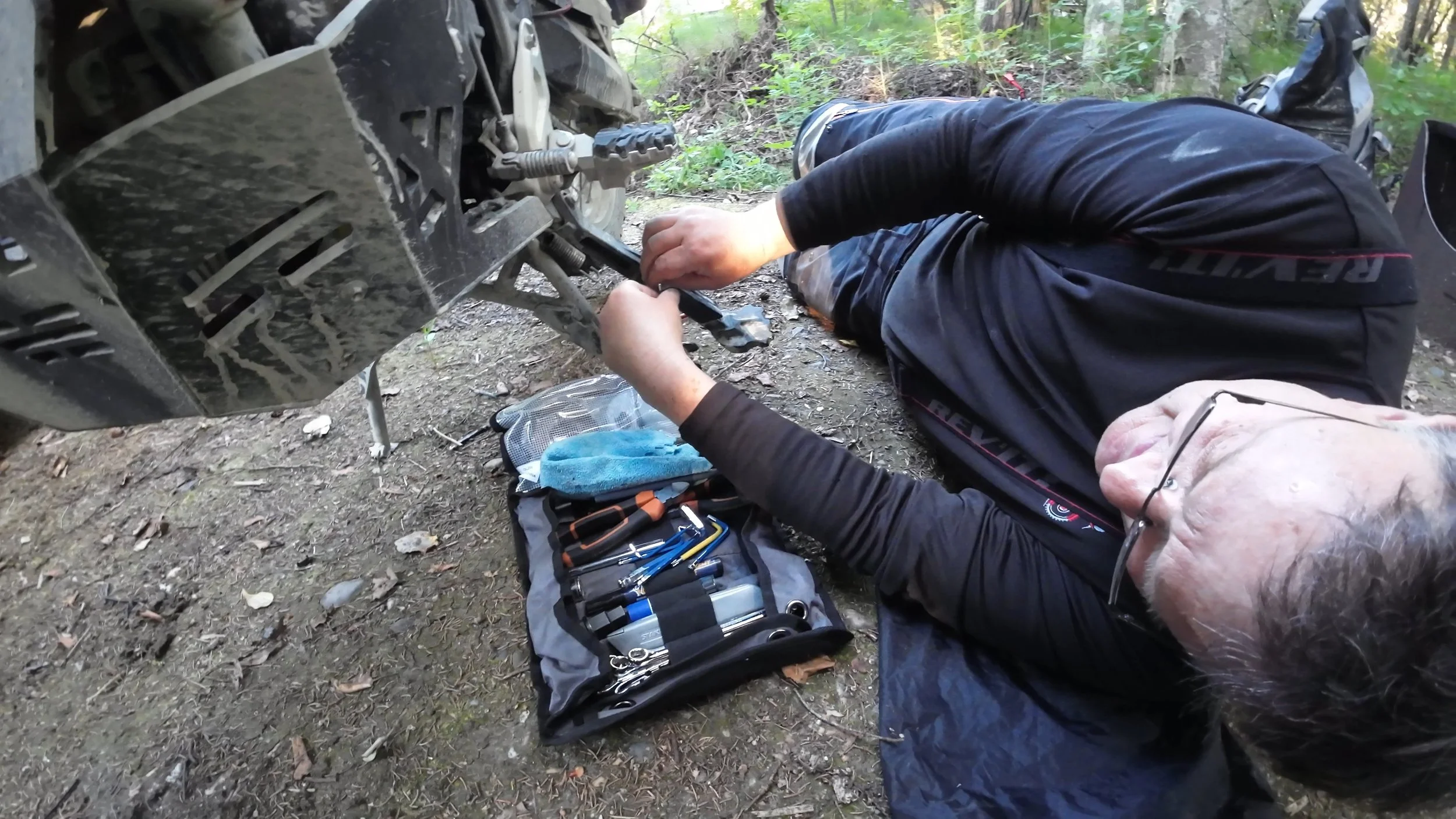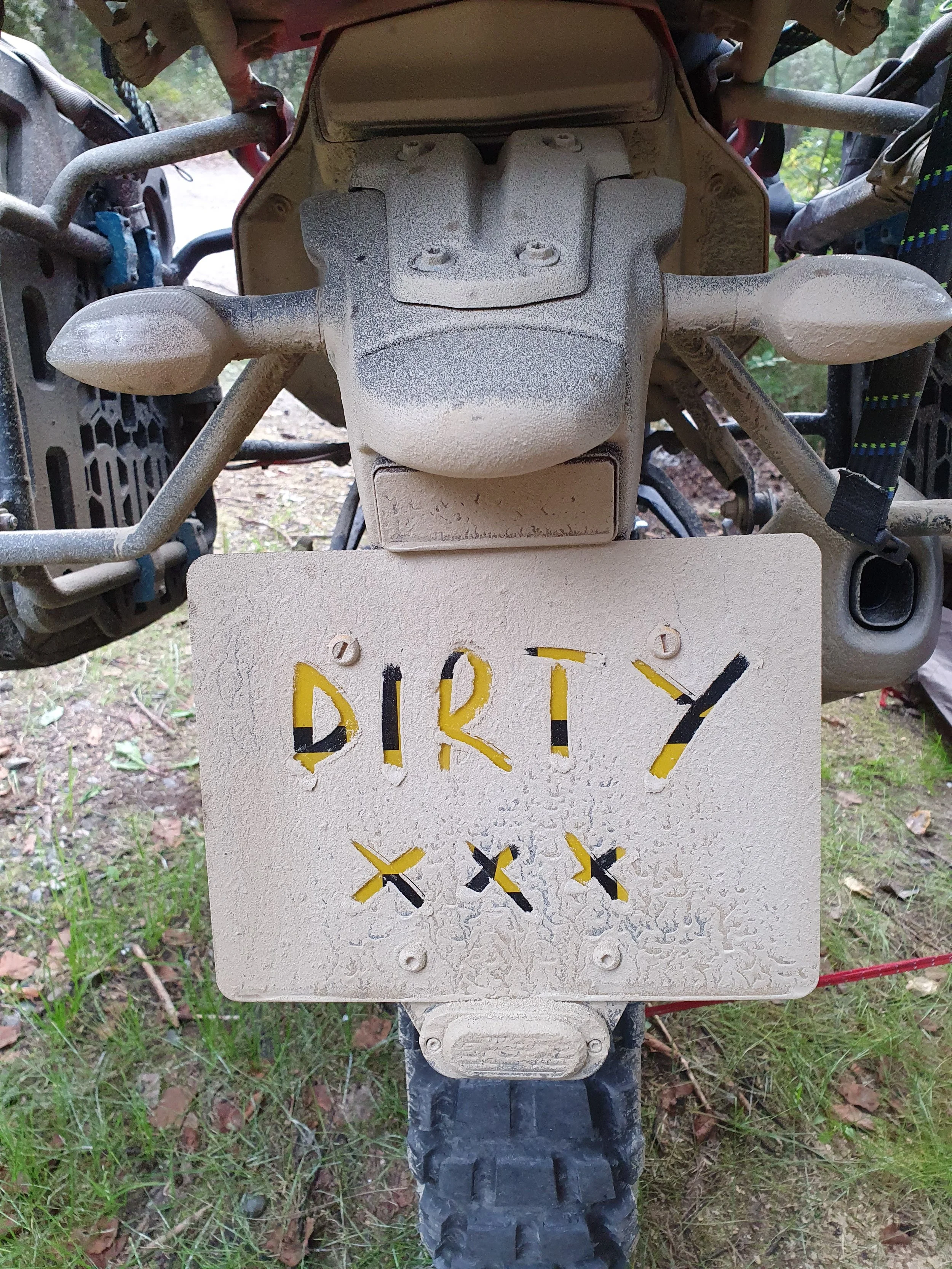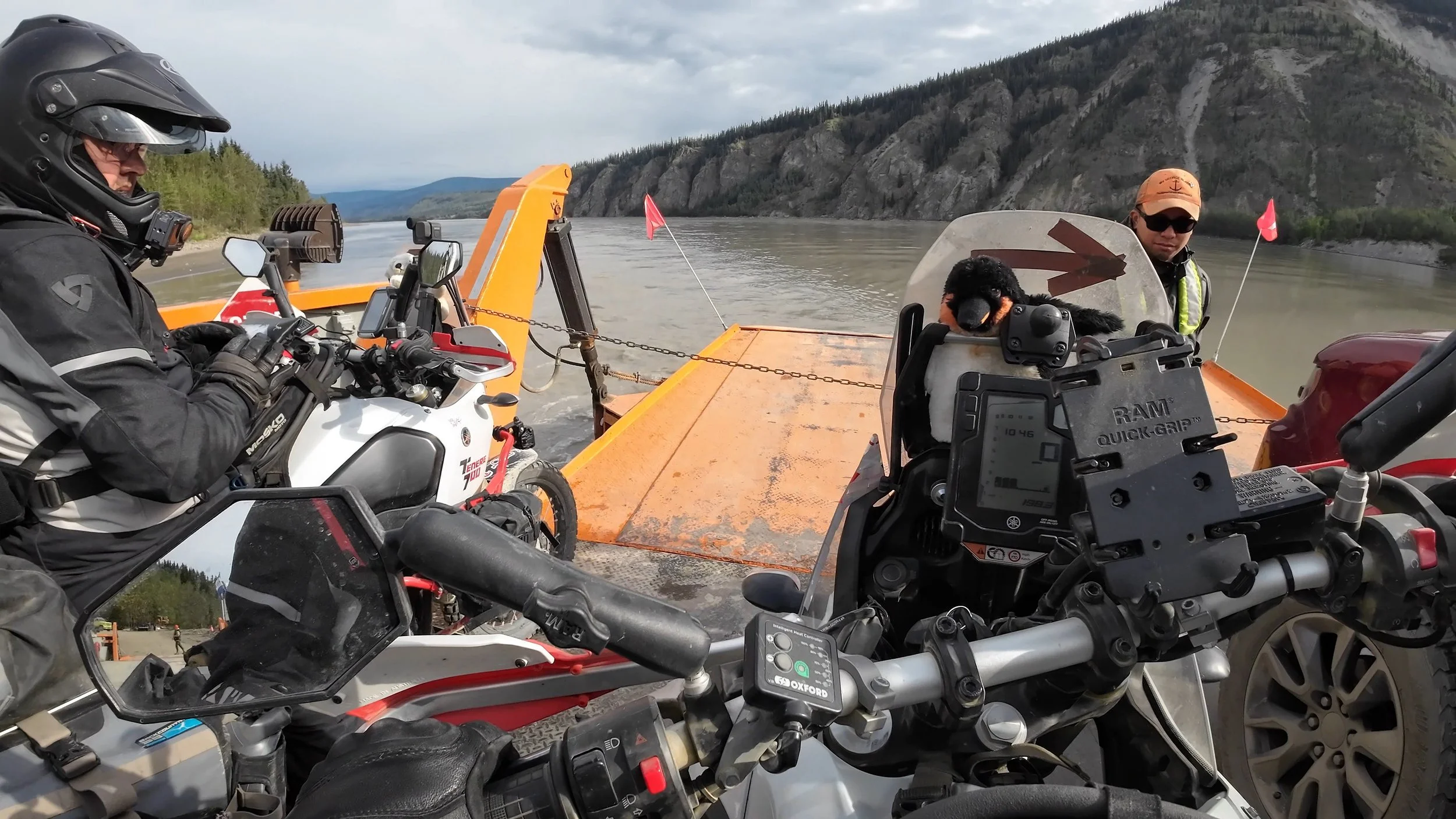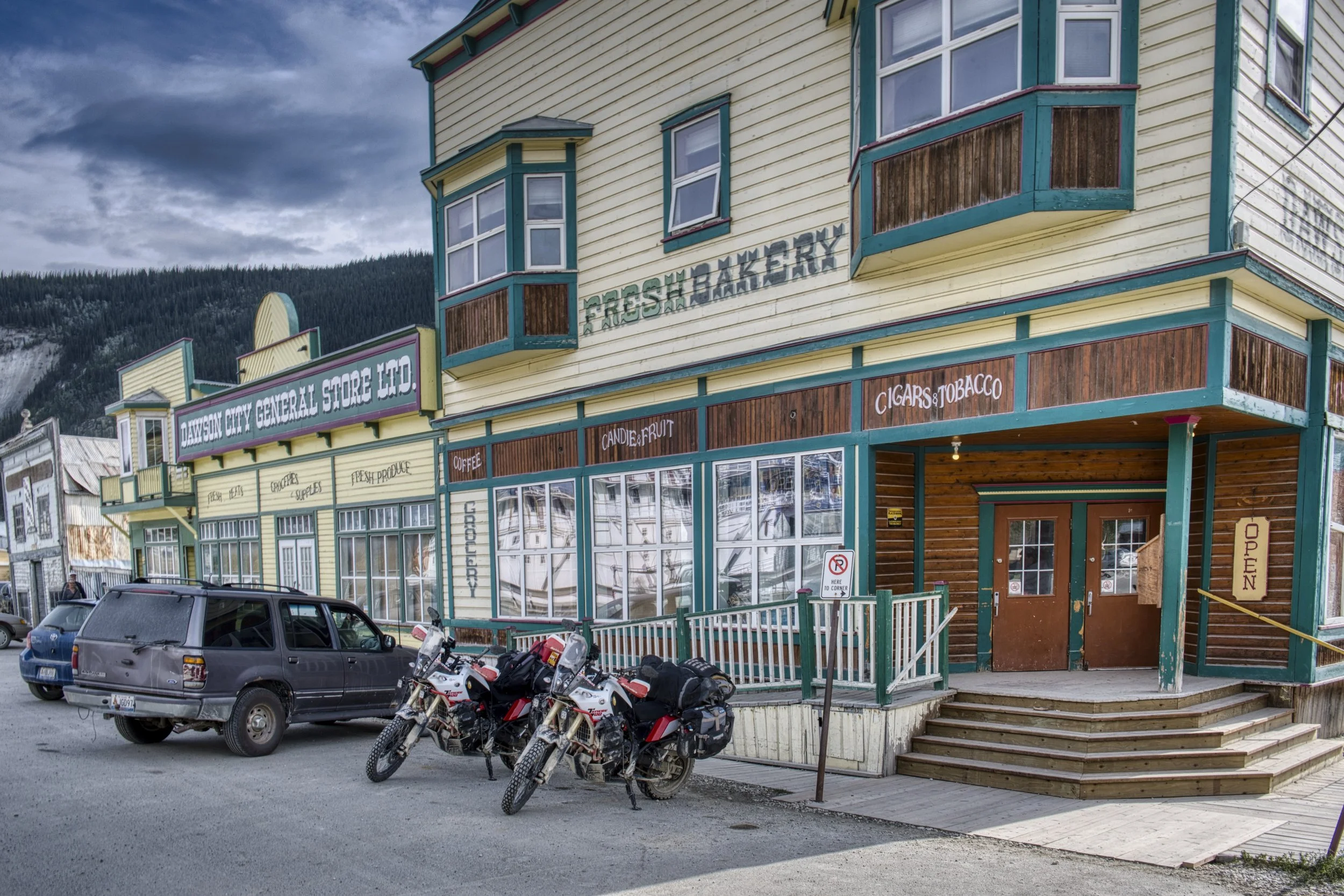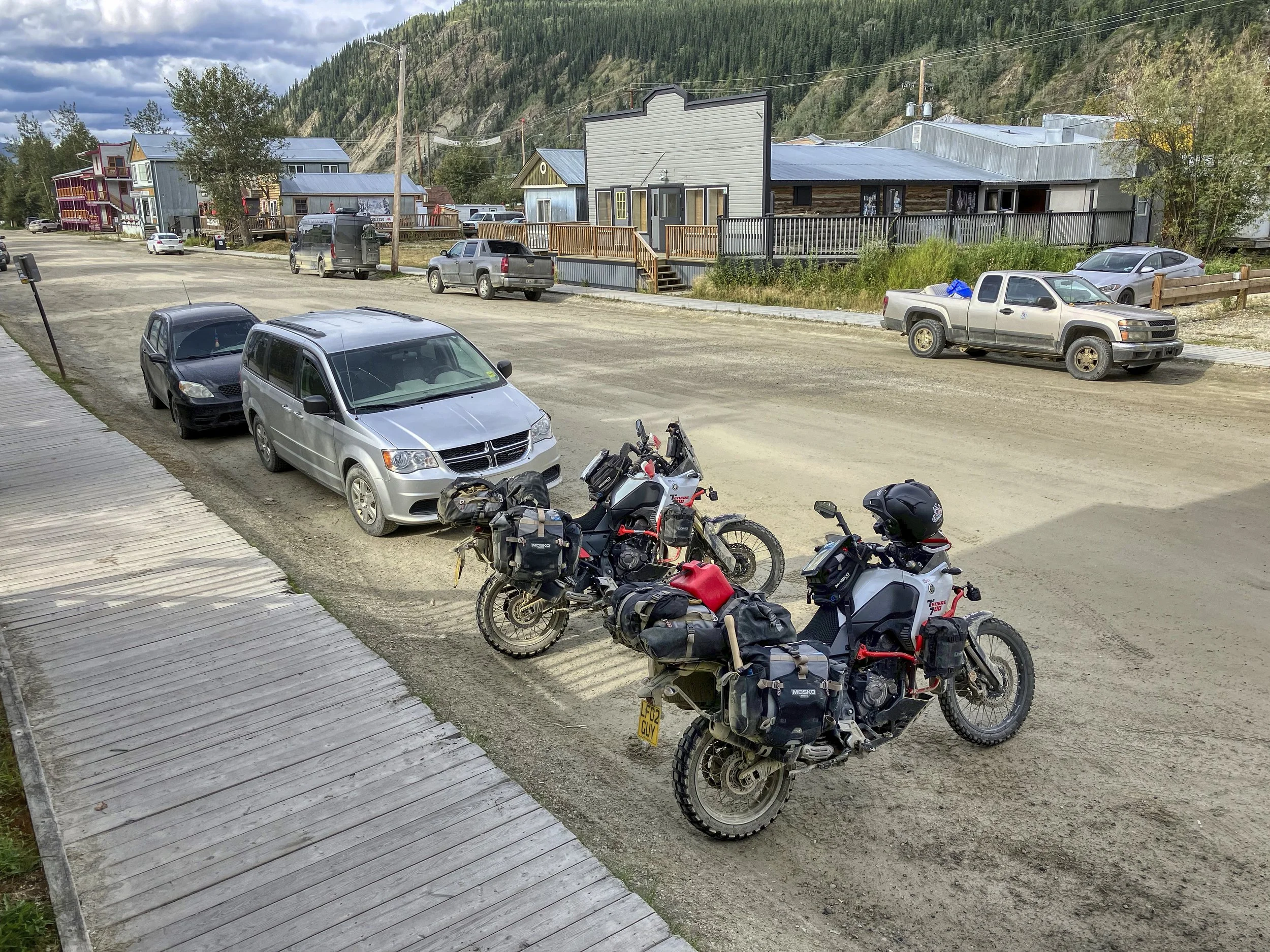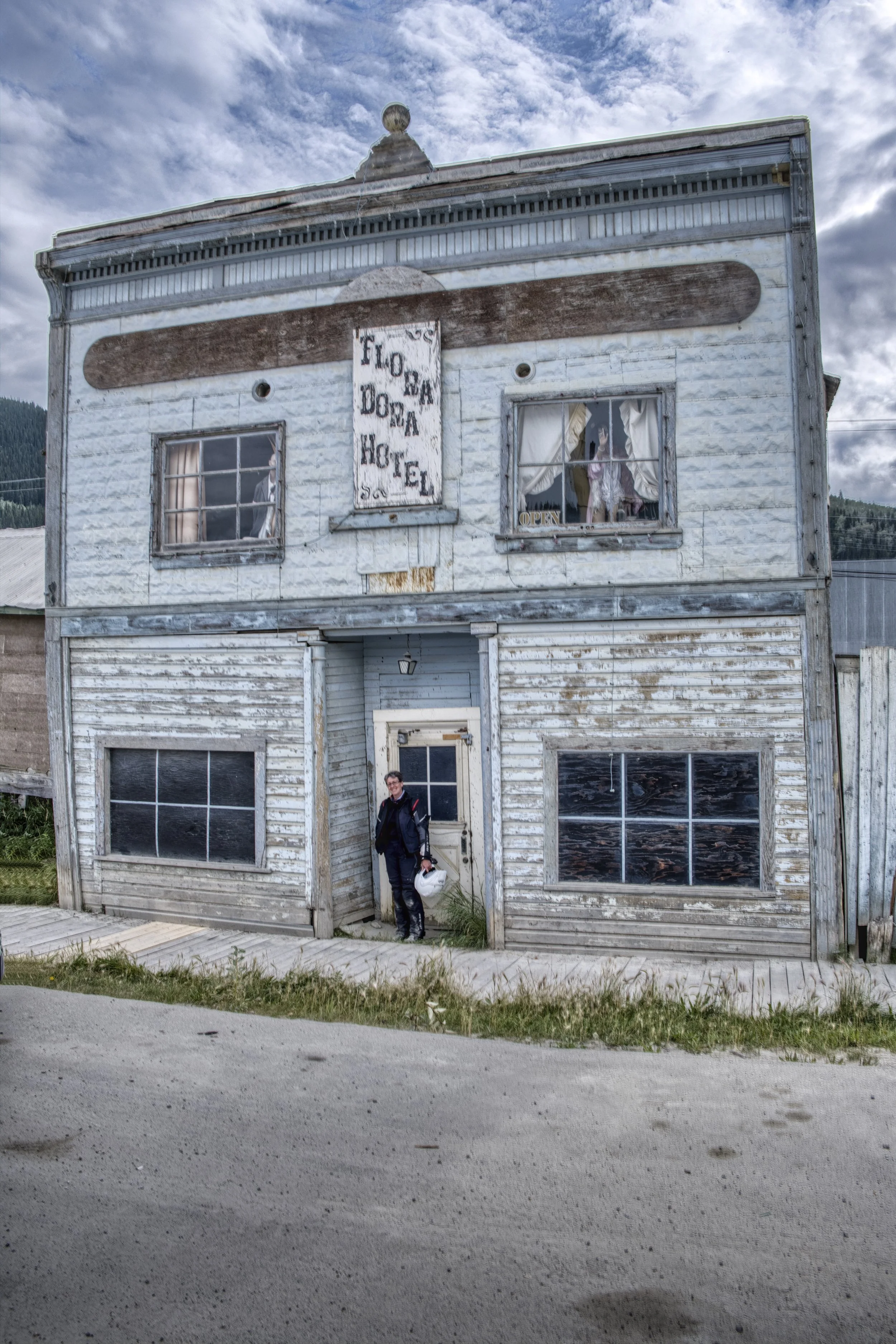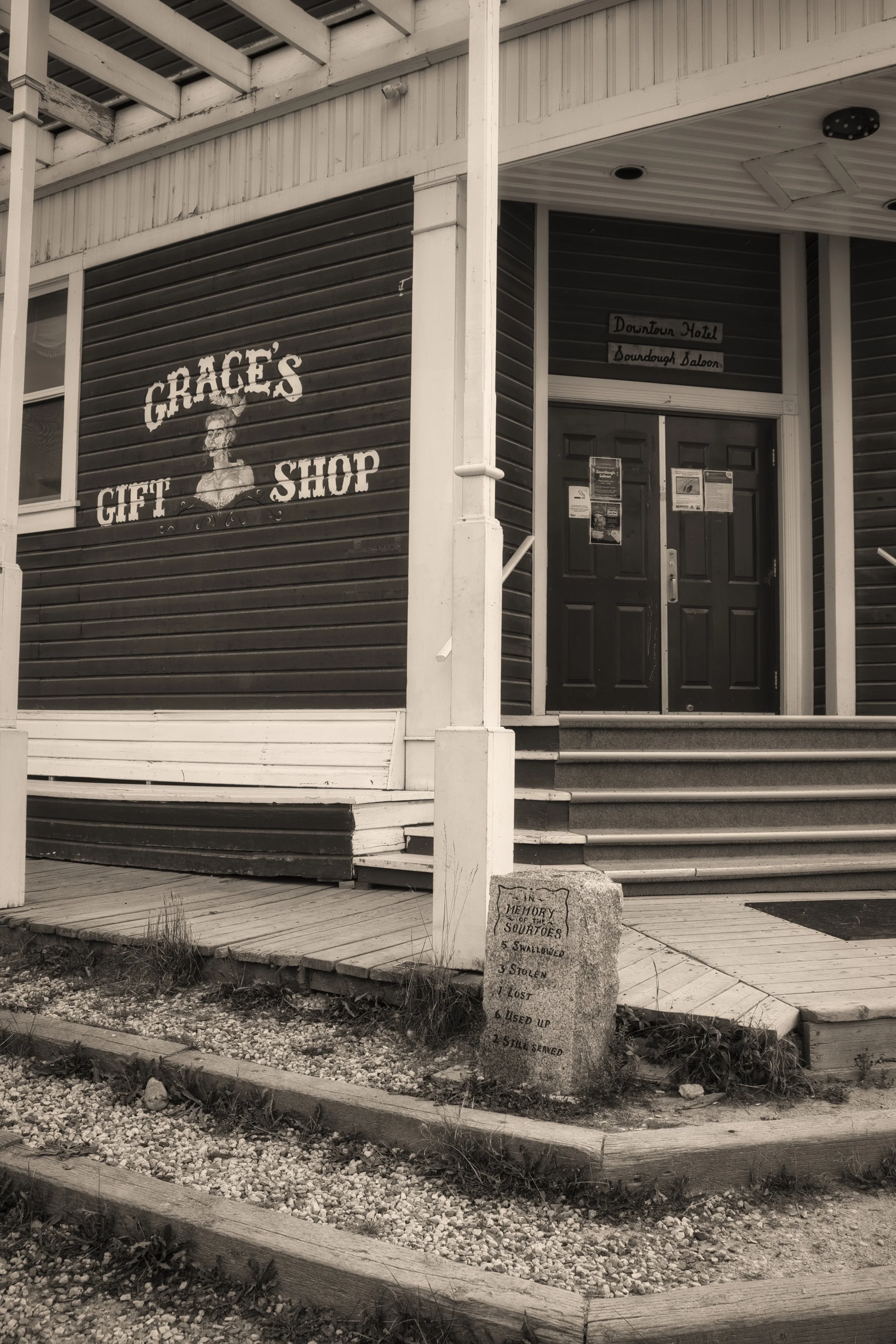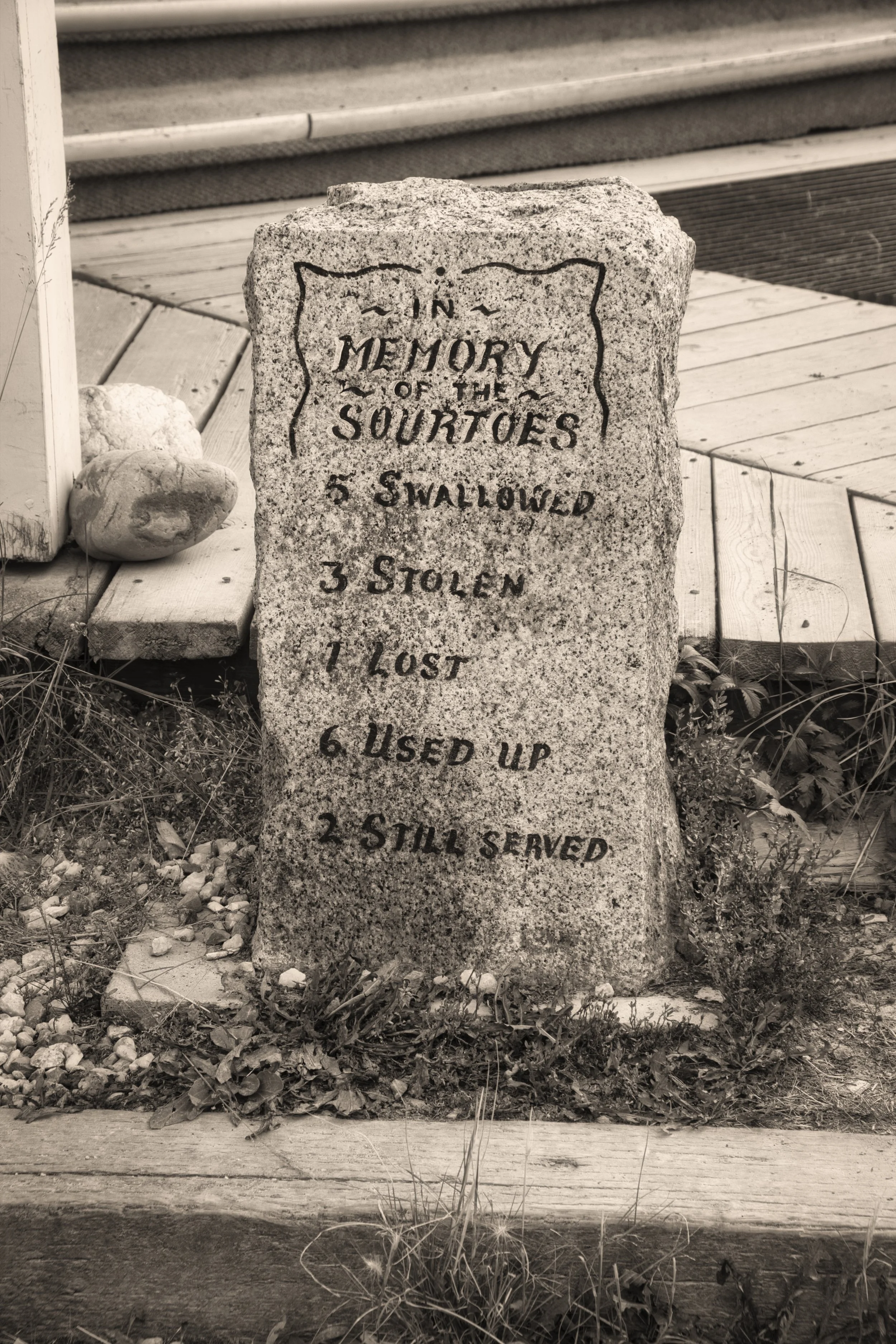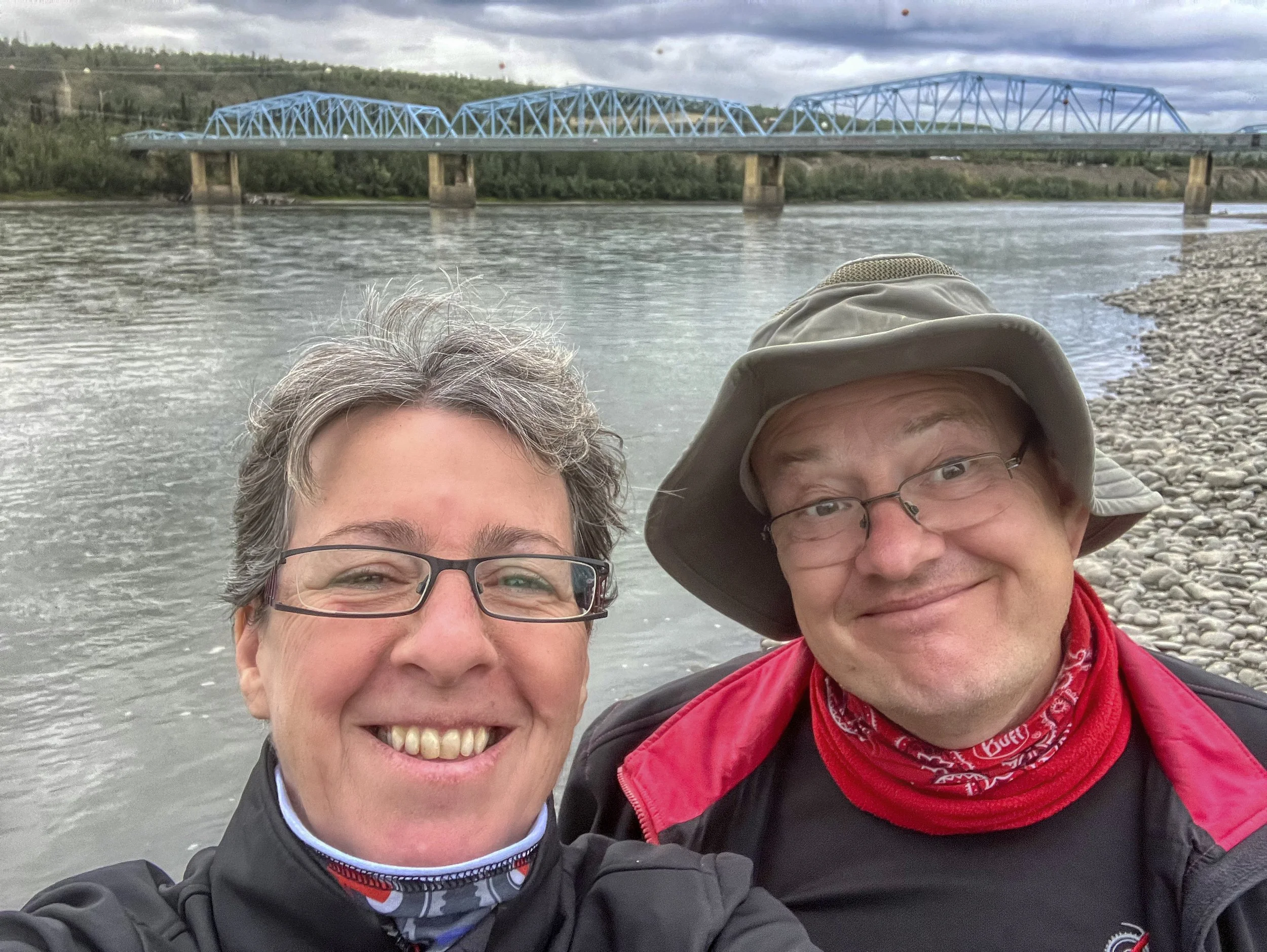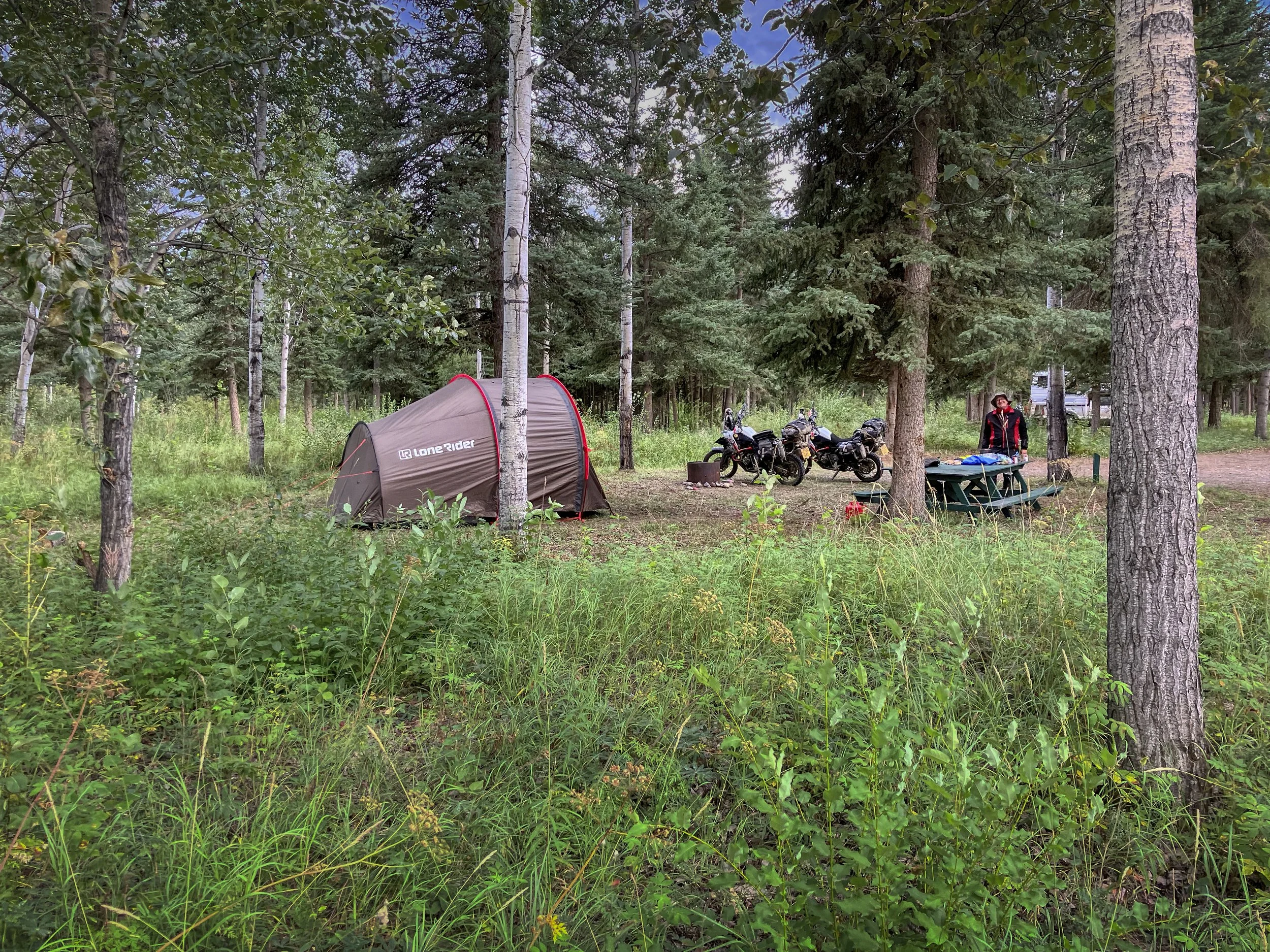No Gas!
After a couple of comfortable nights in Tok, it was time to head out and find the Top of The World Highway (though the first half is the Taylor Highway). The road was bumpy tarmac from the off (after Tetlin Junction), that changed to gravel, just before Chicken. As we approached Chicken, we saw a Moose grazing in the shallows of a roadside pond where, during the summer, the top few feet of ground thaws but below remains permafrost. The water in the top few feet cannot drain, so the whole surface becomes a marsh area of sporadic trees, thick grasses and natural ponds. The moose was obedient enough for me to turn around and get my camera out - with the wrong lens…. But no matter, I got the shot!
As we arrived in Chicken, we wondered what all the fuss was about with the road. Half decent tarmac wasn’t exactly the “deadly” road, some would have you believe. As we pulled in, the Silverstream truck and caravan combo we had shared the last campsite with, pulled in as well - yet another example of playing leapfrog with other travellers on the road. The first thing you see as you enter Chicken is a giant chicken, next to a sign showing all other poultry related named places and their distance from this point. The chicken sculpture was made from many, many old school lockers.
I fully expected the Monty Python crew to appear at any moment.
You may wonder why someone would call a place Chicken. During the gold rush, the Post Office needed to have an office and to do so, they needed a name. This area has a big population of Rock Ptarmigan (a small Arctic region game bird, similar to Grouse) and they wanted to name the place Ptarmigan (silent P). However, they couldn’t agree on how to say or spell Ptarmigan, so they gave in and called the town by the miners name for a Ptarmigan - Chicken.
With plenty of time in hand, we had a wander around the beached dredge, Isi enjoyed an Alaska Chaga tea, made from wild mushrooms and I had a coffee and a bun.
Security was high with such valuable resources being extracted from the earth.
The buckets work like links in a chain, to scoop the gold laden earth in the bowels of the dredge.
High pressure water was used to strip away the top soil and break up the permafrost, to reach the bedrock below.
The chain of buckets would rotate here and gouge the earth to the bedrock.
A chain of buckets discarded on the ground.
Then, it was time to get going and find fuel but…. the pump was dry…. Fuel calculations would mean we COULD POSSIBLY make it, if we conserved fuel and the road remained good. We had no choice but to push on, knowing our fuel would be tight. We did have 2 gallons of fuel strapped to my bike but the fuel anxiety became real. I don’t really know what Isi was worried about - I would run out first (I’m carrying all the weighty stuff! ;-) )
The moment we left Chicken, the road changed. Having been used to relatively wide and open roads, the change to narrow, twisty, loose gravel roads welcomed us with a snigger of the discomfort we were about to experience. We were down to 20-30mph and slower still through the tight bends, knowing the drop off to our right would not be forgiving, given the lack of guard rail. Whilst the majority of oncoming traffic was respectful by providing space and slowing down, there were a few that squeezed us across the road and left us in a shower of rock, stone and dust. It was not nice but, at least, it was dry.
After a number of miles, the corners became less sharp and the road widened. However, the gravel remained as bad and progress was slow - not as slow as the biker on the GS, who was happy for us to go by and made a valiant attempt to keep up with our slow progress. As the Taylor Highway turned sharp left and we carried on to the Top of The World Highway, the road turned to smooth tarmac. Thinking we were close to the USA/Canada border, we looked for a place to stop and consume our food - some borders do not allow certain foods to cross and we weren’t taking any chances. In the next lay-by was the Silverstream, doing a similar thing - eating. We explained our concern about range and they offered us fuel but, being British, we said we’d be OK and soldier on in the true British Grit (AKA stubbornness). They left ahead of us and the 2 gallons with them - another lemon to be counted.
EAT! Before the border…
As it turned out, the tarmac was not a sign the border was close. Instead, we felt like we were on top of the world, just as the highway is called. The road followed a ridge for mile after mile, with fantastic views on either side, with a few forest fires making their presence known with the potent smell of burning pine. As we rounded a tight left bend, there were random and out-of-place signs for coffee, snacks and ice-cream, so we pulled in and stopped outside the shop where 6 people were sat.
”Do you have any gas?” I asked.
As quick as you like, the lady said “yes, $7 a gallon”.
It seemed obvious she had plucked this figure from the air as one or two of the group raised their eyebrows.
”That’s good - I’ll take 2 gallons”, knowing I needed some and it was still cheaper than back home.
Two guys jumped up and pointed me toward a container, similar to the one we saw at the Yukon river crossing, on the Dalton Highway. Difference being, there was no pump to measure quantities. I decided, the best action was to empty our spare fuel in to the bikes and fill the 2 gallon container from the bowser - no arguments on quantity and IF the fuel was bad, I could test it in the stove before using it. So that’s what we did. $14 lighter and 2 gallon heavier, we left the Borderlands and headed for the border.
Borderlands
I was expecting to go through US customs before reaching the Canadian customs, so when we reached a stop sign, I assumed we were still in Alaska.
“What wonderful roads and weather you have here!” I stated to the immigration officer that appeared from the door to my left.
”You wait. A few miles that way and it’ll all change”, he said.
”Yeah but that’s Canada for you!” I said, just as I noticed the Canadian badge on his upper arm.
Realising my mistake, I quickly blurted out something to change the tone of my previous statement and, thankfully, Perry had a good sense of humour and the ice had been broken. Some formal questions around weapons and pepper spray (bush knife and bear spray don’t apply in either category), with a bit more light banter and we were good to go. In to the Yukon Territory and it was time to fit the Canadian flag to the front of the bike.
Canadian Customs
Canadian Customs
Perry was right, as we continued on the high ridge of the Top of the World Highway, the road changed back to hard-pack, ridged dirt and then, to make matters worse, patches of road had been soaked by passing rain making them rutted and slippery. The road would continue to change from wet to dry as we continued on the ridge, watching the rain showers travel across the landscape.
Finally, we started to descend and pulled in at the next pit toilet, as Isi was keen to see the difference in toilets, comparing Alaska with Canada. The Canadian toilets were more akin to wooden sheds and most did not have a vent stack. Hence, they tended to be more smelly and certainly less cared for.
City Limits
City Limits
Dirty!
As we neared Dawson City, the descent steepened yet the roads remained wet and slippery. At times, we were in 1st gear and using the engine-braking and rear brake to control the descent. Finally we reached the bottom and pulled up just before the Dawson City ferry. We decided not to cross tonight and instead, chose to look in the campsite beside the river. It was busy and we couldn’t get a spot by the river. Instead, we rose a couple of tiers and found a ‘group’ site with bear-boxes - a quiet pitch off the main drag. Or so we thought. The RV in the pitch two down obviously had poor leisure batteries as the generator seemed to run non-stop, until 8pm that is.
Fixing the loose sidestand. Pleased I packed a spring puller…
Bearbox to lock all the food and smellies in
The following morning whilst waiting for Isi to rise, I wiped the lights and plates free of all the (now dried) fine dirt and the generator started at 8am exactly. I don’t think RV’s realise just how anti-social generators are, as they hide behind their double-glazed windows. Then again, I can be a grumpy old man before (and some would say after) my first coffee of the day.
Not happy!
I was being polite, OK?
Packed up and ready for the ferry, we marvelled at how the ferry boat captain was so precise with the ferry position, against such a strong river flow. With such precision, I thought the ferry was on a chain, but it is not. Our turn to load and we had front row seats, perched on the bow with just a chain between us and the riverbed. Then in to Dawson City!
Ferry across the Yukon
Getting off the ferry and in to Dawson City
Dawson City only exists because of the worlds biggest gold rush that took place in the late 1800’s. We arrived on the very day that gold was first found 125 years ago and marked the start of the gold rush. However, the festivities would not start until the weekend - go figure! Men and women of all nationalities made their way up the treacherous Klondike river in pursuit of riches being found in the ground and the river. Our first objective was to get cash. We had paid the previous nights camping with $US, so we needed $CAD. Where did we find the bank with a cashpoint? Right next to the shop that sold weed. Yes Canada have also made weed legal and why not? Less harmful than alcohol (IMO) and legalising it means the government can control the availability and tax it. I wonder how long before the UK follow suit.
Dawson City General Store
Dawson City road and sidewalk
Good time.
I so wanted to kiss the toe…
Thankfully, it was closed…
We bumped in to a chap that took an interest in the bikes. He was visiting from the lower 48 and had intended to stay a few days - he’s been here for 2 months, living from his small trailer parked on the High Street. He was practicing to be a DJ on the local radio, but the radio manager had not turned up, so he was at a loose end. Amongst various topics, he mentioned the restored Dredge 4, just out of town, should we wish to visit it.
But we had food on our minds. The problem with travelling by bike is the limited space for food and no fridge, so food is purchased every other day, at best. Today we needed to go shopping…. The food prices are high in what appeared to be the only General Store in town. The aisles were narrow and packed with shoppers and staff. I ended up waiting outside, with the bikes, while Isi finished the shopping. I noticed an elderly man in his car that had driven past a number of times - obviously looking for a parking space, though there were spaces just 3 or 4 cars up (we were right outside the shop door). I didn’t think anything of it.
When Isi came out laden with food for the next 2 days and lunch, we took the shopping basket across the street and found a rock to sit on to prepare lunch. The elderly man wound down his window and sarcastically shouted “Oh, that’s alright then. I’ll wait until you’ve finished your lunch!” and then he turned away. Back in the UK, I would probably have started an argument but, after a few moments thought, I decided to move both bikes across the street. He sat in his car, watching but refusing to acknowledge me and, as I moved the last bike, I said “there you go” but he still did not acknowledge me or offer anything like a thank you. As it turns out, he could hardly walk and seemed to be in pain, so I wondered how many other days he had struggled to get the spot right outside the grocery store.
After lunch, we decided we must move on if we were to get to Pelly Crossing in a half-decent time.
On the way out of town we took the road pointing toward the No.4 Dredge. The road quickly turned to gravel and hard-pack mud and I was explaining to Isi about how the trommel worked and how legislation had changed since the days of the gold rush. The whole road was still a massive line of old tailings piles and new works - all in the pursuit of gold.
Dredge 4 (it used to float).
We came up behind a small car that was taking longer to navigate the poor road, so they pulled over to let us pass. As we reached No.4 dredge, the car followed us in and parked up. As seems to be a regular theme, the man came over to ask about our number plates, just as everyone else seems interested - worth every penny we paid for them. The elderly gent then told me he used to work on this very same dredge in the 1950’s. It was cold, noisy, wet, hard work and all for a $1.25 a day, from which his accommodation was deducted. Yet he still remembers going in to town to drink the ale at $0.50 a pint. To him it was just a job and it is only later in life he realises he was a part of something big - Canadian history. It was an honour and a privilege to spend just those few moments with him.
Then it was back to the road. Good, well maintained roads were broken up with degraded tarmac sections until the construction zones appeared. As we pulled up at the red light, the three trucks (with caravans) we had just overtaken pulled up behind - they gave me a round of applause as I managed to slide off the bike to stretch my legs. I bowed and laughed and we got talking whilst waiting for the convoy car. Then it was our turn and the road was wet and very slippery - hard work!
One more section of construction and we were getting tired. It was raining, we were cold and we just wanted to reach the campsite at Pelly Crossing. We pulled into a lay-by to check the map and work out what time we had left. As I dismounted I caught my right boot on the pannier but my bodyweight had gone beyond that point of no return. While I tried to push up with my left leg, my right suddenly freed itself and WHAM! I was catapulted in to the ground. I swore over the intercom and Isi turned around to see me flat on the floor - I was doing a quick mental and physical check to make sure nothing was broken. I was sore, got back up and thought nothing else of it.
Pelly Crossing campsite is a free site maintained by the First Nations people. It was busy but plenty of spots to use. The pit toilets were clean and didn’t smell too bad. We pitched the tent and cooked food. The Austrian father and son on the next pitch commented on how much fresh vegetables there was and we just said we liked to eat well (we found out the next morning that father and son had been living off dried food and lentils for the last 2 weeks as they canoed the Yukon river. Once we found out, we left them our lunch - 2 apples as that was all we had.).
Pelly Crossing Bridge
Pelly Crossing Campsite
After eating, we filled the bear-bag and hoisted it from a tree before moving on to another pitch to join the people of the 3 trucks for a natter over the campfire - but then it rained…. rained hard…. That was the end of the evening and just as we were going to sleep, Isi asked if the bear bag was waterproof. I guess we would find out in the morning…

